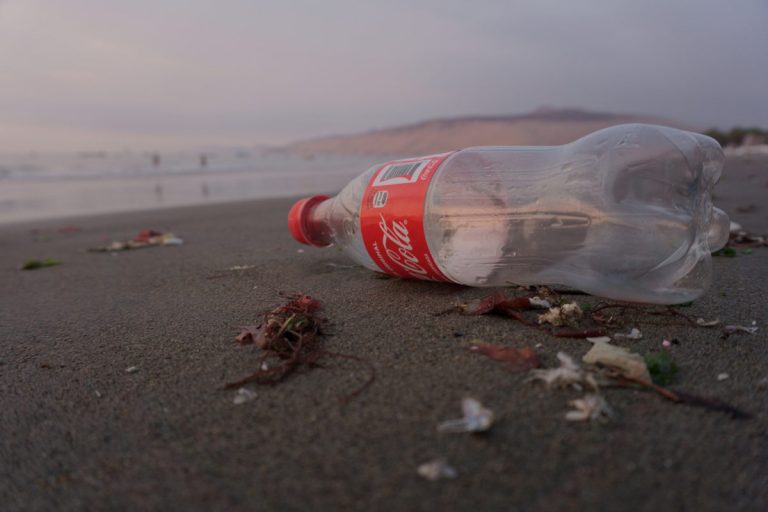What do Coca-Cola, PepsiCo and Nestlé have in common? Plastic pollution

Who are the world’s biggest plastic polluters?
For three consecutive years, Coca-Cola, PepsiCo and Nestlé have been called out as the world’s top plastic polluters, and on top of that, they have also been accused of making zero progress on turning this fact around, regardless of the promises that the major brands have made in the past. A Coca-Cola spokesperson announced at this year’s Break Free From Plastic’s (BFFP) brand audit that “Globally, we have a commitment to get every bottle back by 2030, so that none of it ends up as litter or in the oceans, and the plastic can be recycled into new bottles.” What exactly are these giant corporations doing to reverse the damage they have already done, and just how much damage are we all helping them create?
Every year there is a press conference that involves counting and documenting brands from all over the world on plastic waste. For 2020, Coca-Cola, rather unsurprisingly, came out as the world’s number one plastic polluter after its beverage bottles were the most frequently found disregarded in our environment within 51 of the 55 nations that are surveyed. This is a jump up the ladder from last year’s result where they took the 37th place. In fact this year, Coca-Cola was found to be worse than both the second and third worst plastic polluters, PepsiCo and Nestlé, combined. The three together however are responsible for half a million tonnes of plastic pollution in just six developing countries each year, according to a survey by NGO Tearfund.
What have Coca-Cola, PepsiCo and Nestlé done against single-use plastic?
BFFP’s global campaign coordinator Emma Priestland stated that “The world’s top polluting corporations claim to be working hard to solve plastic pollution, but instead they are continuing to pump out harmful single-use plastic packaging.” Priestland also said that the only way to halt this global tide of plastic littering was to stop production by phasing out single use plastics completely and implement reuse systems instead. She focused on a point that “Coca-Cola, PepsiCo, and Nestlé should be leading the way in finding real solutions to reinvent how they deliver their products,” as such enormous corporations are the ones whose changes can have crucial impacts.
The latest report from the Ellen MacArthur Foundation has made it sadly clear that these corporations have made zero progress in addressing the plastic pollution crisis. If business continues at the current rate of escalation for these three brands, plastic production and all the harm it induces could double by 2030 and triple by 2050.
According to a 2017 study, up to 91 per cent of all the plastic waste ever generated has not been recycled, meaning that it ends up being incinerated in landfill or being found contaminating the natural environment. Plastic pollution isn’t just down to the three corporations named above, it also points towards things such as cigarette butts and sachets (of ketchup or coffee and shampoo). The data collected from BFFP’s report reveals that other companies that make up the top ten plastic polluters in the world are Unilever, Mondelēz International, Mars, P&G, Philip Morris International, Colgate-Palmolive and Perfetti Van Melle.
The BFFP report has said that the COVID-19 pandemic has without doubt made an impact on the plastics system in 2020. However, this year’s report is based primarily on 2019 data, which means that the effects of the pandemic are not yet reflected in the numbers contained thus far. When it comes to next year, the data is expected to be evident, in a shocking way, due to the fact that single use plastic, in take away items like coffee cups or personal protective equipment, has increased as a safety measure towards combating the virus.
That being said, in a joint statement published in the Financial Times in June 2020, over 50 policy makers, CEOs and other influential individuals highlighted ‘circular economy’ as a solution to build resilience into the global economy in response to the economic impact of the COVID-19 pandemic. The Global commitment progress reports that “Others have even raised their ambition level in the last few months, with companies such as L’Oréal and Colgate-Palmolive Company setting new, more ambitious targets to create a circular economy for plastics over the past months.”
Overall, the plastic pollution reports are dire and disheartening, but by getting this information out into the general public and raising awareness to our own responsibility as consumers is one step in the right direction. A reinvention of how corporations deliver their products is necessary before the ever growing crisis becomes unmanageable. The ball is in your court Coca-Cola.




